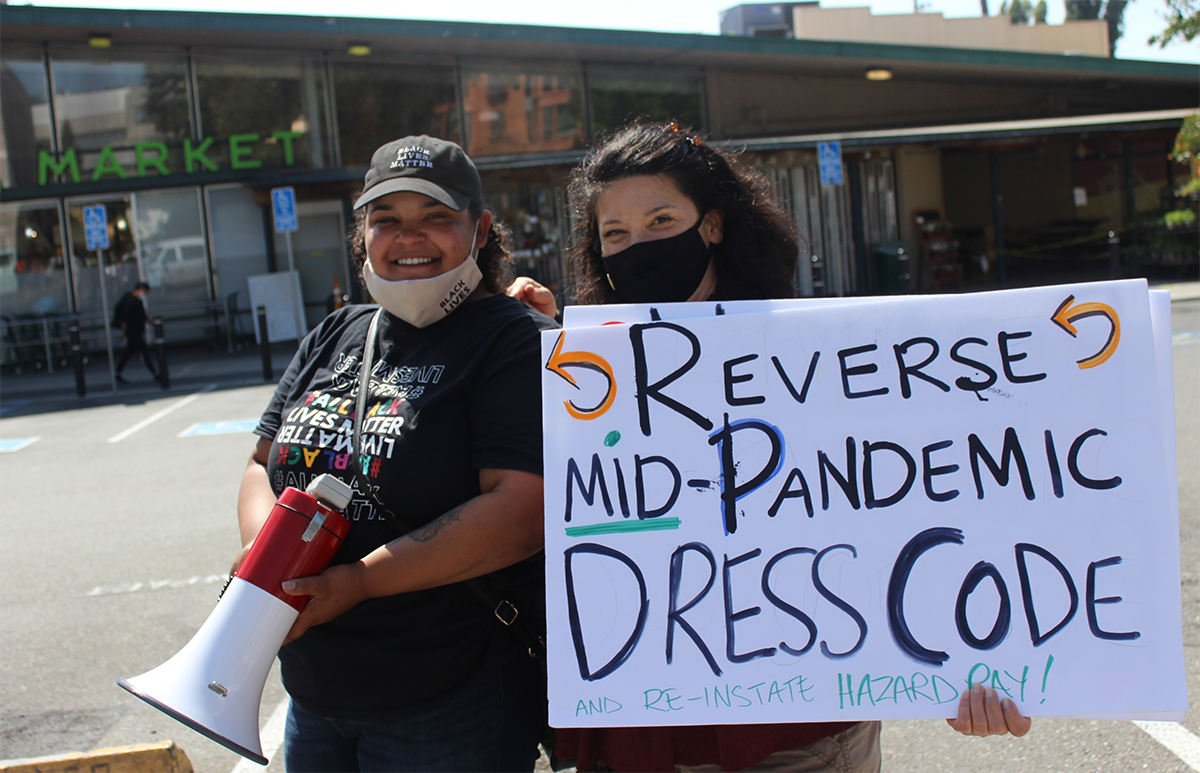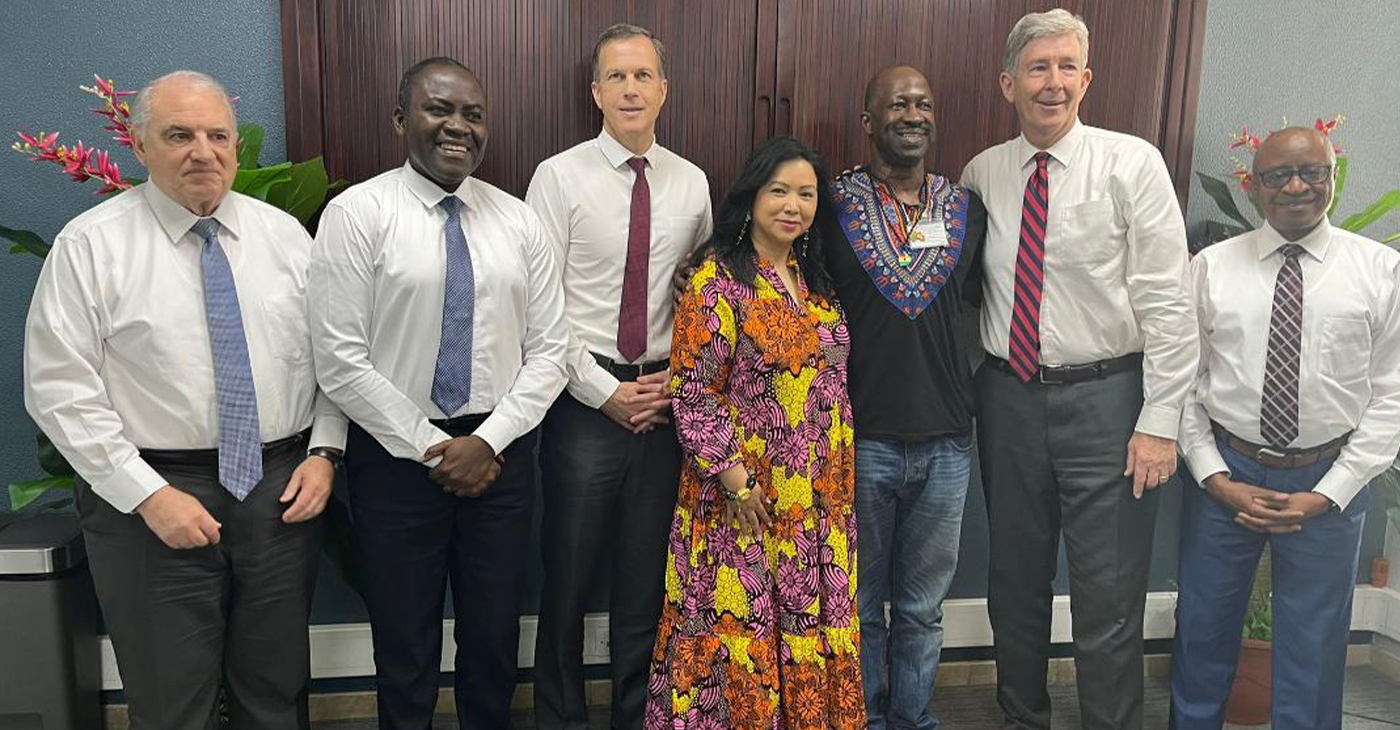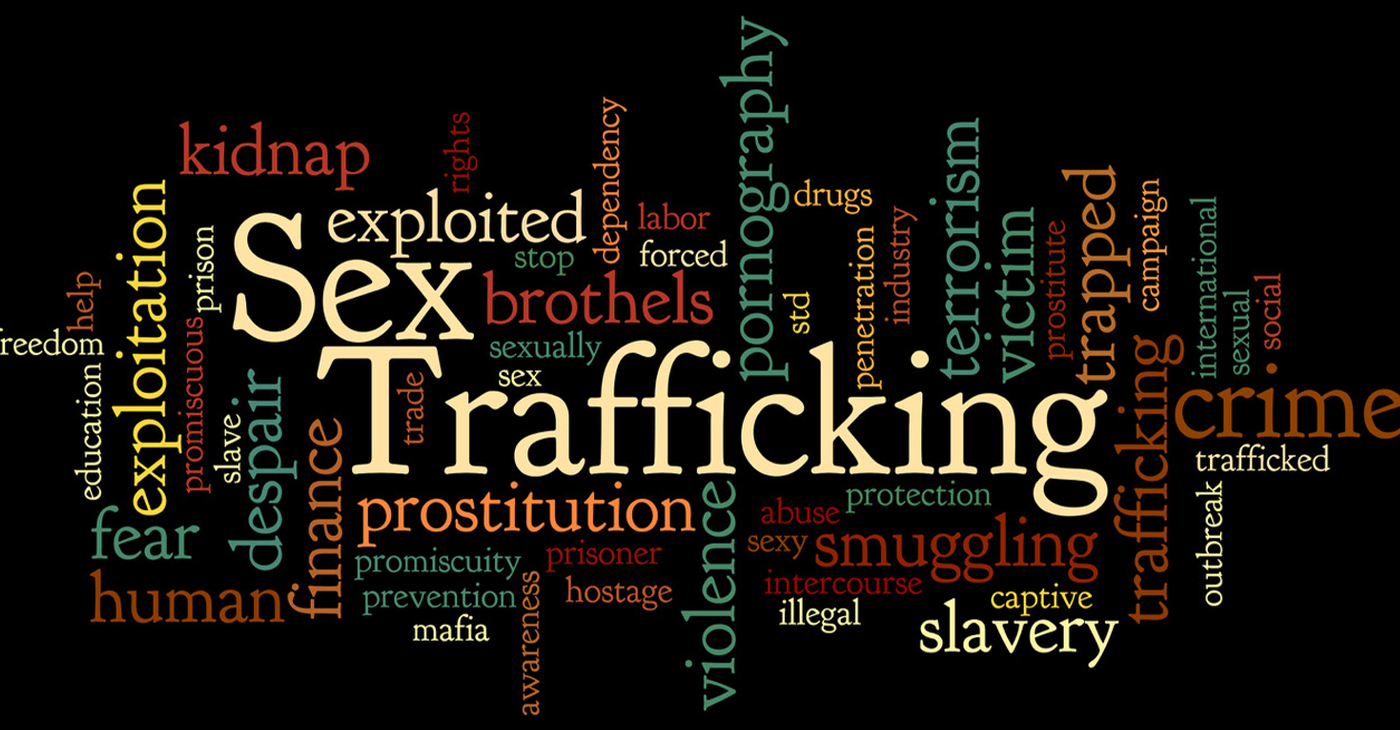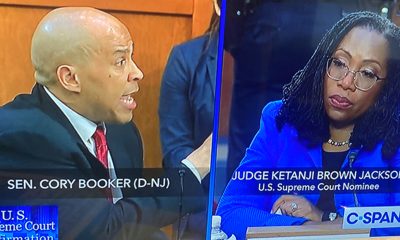Activism
Protesters Rally for Whole Foods Workers to Openly Support Black Lives Matter

About 35 Whole Foods workers, ex-workers and supporters gathered outside of the store’s Berkeley Telegraph Avenue location on Saturday afternoon to protest the company and local management not allowing workers to wear masks and attire that says “Black Lives Matter.” The action followed and built on a similar larger event that occurred on Friday, July 17, when, according to ex-Whole Foods worker Jordan Baker, about 250 people rallied outside of Whole Foods’ Gilman Street location.
Although protestors said they were also responding to a long history of racism and white supremacy at Whole Foods, one specific incident helped spark the rallies: management at the Gilman street location demanding that Baker, who is Black, remove a mask that said “Black Lives Matter” on it on July 14.
“Store leadership told me they wouldn’t want to get in the middle of me and an angry customer who was offended by me wearing something that says ‘Black Lives Matter,” said Baker. “They told me it was akin to someone wearing a MAGA mask and that it was a controversial statement.”
Management gave Baker the option of wearing another mask or leaving for the day. Not wanting to compromise her principals, Baker decided to leave. Although she had worked at Whole Foods for seven years, her entire adult working life up to that point, she quit the next day she was scheduled to work, July 17.
“I honestly don’t want to work for a company who only ‘supports’ a movement when it makes them look good or makes them money,” said Baker in an Instagram post she wrote on July 14 and edited on July 17.
Although Whole Foods’ website and a sign outside their Telegraph location states, “Racism has no place here,” and “We support the Black community,” other workers locally and across the country say they also have faced repercussions for displaying the message “Black Lives Matter” while working in the store.
Workers at a Cambridge, Massachusetts Whole Foods said that, a little over a month ago, their management sent several workers home for wearing masks that said “Black Lives Matter.” One worker, Savannah Kinzer, was fired shortly after. The workers have filed a discrimination lawsuit that alleges Whole Foods enforces their dress code in a selective way to specifically suppress those supporting Black Lives Matter, including sending workers home without pay, and that Kinzer was fired specifically because of her open support for Black Lives Matter. Whole Foods workers in Seattle have protested due to similar treatment.
Ann Del Rio, who worked at Whole Foods’ Telegraph Avenue location until recently said that management at that store selectively enforces their dress code as well. While the code does not allow workers to wear apparel with messages unrelated to Whole Foods or the products it sells, workers regularly wear sports t-shirts and shirts with names of heavy metal bands on them. Yet a little over a month ago management told a worker wearing a Black Lives Matter mask and one wearing a Mexican Flag mask to take them off.
Del Rio said management escalated efforts to enforce the dress code on July 17, the same day of the protest outside of the Whole Foods’ Gilman Street location, telling workers they were going to start enforcing the dress code more stringently, specifically pointing out buttons and masks with messages on them. At that point, Del Rio had already put in her two weeks’ notice and planned to quit to work another job. But she left three days before her planned last day when management gave her an ultimatum: stop wearing a small Black Lives Matter button or do not come to work.
“I would rather lose three days of work than compromise my ethics,” Del Rio said. “It was very clear that them really coming down on the dress code policy is because they don’t support the Black community and they don’t want to alienate their white customer base.”
The store was closed during the protest due to a power outage, according to Whole Foods representatives on-site. Yet the protest still got attention from those unaffiliated with the store. People driving cars along Telegraph Avenue honked their horns as protesters held signs accusing Whole Foods of racism. A van with the message “WHOLE FOODS IS RACIST” in large spray-painted letters was on display.
A nurse, Eric Torres, who works at Sutter Health Clinic which sits across the street from the Telegraph Whole Foods store, got to work a little early and decided to join the protest. He did not know, before he saw the protesters, about the action.
“I’ve got 15 minutes and I’ll use my 15 minutes for something good,” he said. “I read about Whole Foods and people not being allowed to wear BLM stuff at work. So when I saw people out here I knew what they were supporting. It’s just about human decency.”
Torres held a sign, which Baker made that read “‘RACISM HAS NO PLACE HERE’ SAID THE RACIST.’”
“I have endured racism all my life,” said Denise James, a 66-year-old Black retired teacher who lives near the store and passed by the protest. “It’s unfortunate and awful and detrimental in so many ways to African Americans. I’m so glad that there’s a movement now to highlight all these issues.”
James was happy to see the protestors, saying “more power to them.” She called Whole Foods “two-faced” for displaying a sign on their store that reads “Racism has no place here” while not allowing workers to openly support the Black Lives Matter movement.
John Hopkins, an Amazon worker who is trying to organize other local Amazon workers through an organization called Bay Area Amazonians came out to support and stayed for several hours. Since Amazon owns Whole Foods, he sees their fights as related. He wore a Black Lives Matter mask and held a sign he made that read “Solidarity Means Saying BLACK LIVES MATTER!!!!!!”
“Black Lives Matter should not be a controversial statement, “ he said. “The fact that it is is systemic racism.”
John Farmer, an ex-Whole Foods employee of seven years who quit because he said the workload was too much for the pay, spoke through a loudspeaker to the protesters and those passing by.
“Attention Berkeley: Whole Foods is closed due to an outbreak of racism,” he said, jokingly. “They are too racist to operate.”
Other protestors used the loudspeaker to call for Whole Foods to pay reparations and reinstitute the two dollars an hour COVID related hazard pay allotment that the company began in March but ended in June, even as COVID cases have continued to rise nationwide.
Protestors chanted “Black lives matter,” “All Black lives matter,” “Whole Foods is racist” and “Jeff Bezos is racist” often.
Although the protest was scheduled to happen between 1 p.m. and 4 p.m., it ended up running longer than planned and the last people left just after 5 p.m.
“Black people deserve to know that they are respected and protected,” said Baker. “I wore my mask because saying Black Lives Matter isn’t controversial. I had a lot of support shown to me and the others throughout the company who are receiving the same treatment. Taking a stand against Whole Foods and being a part of the biggest ‘fuck you’ that they have received in a long time feels good and it feels like it’s been a long time coming.”
When emailed, Whole Foods Media did not respond to the question, “Does Whole Foods support the Black Lives Matter movement?” Instead, they sent a statement that was identical to one published in a recent Berkleyside and Boston24News story. It reads as follows:
“In order to operate in a customer-focused environment, all Team Members must comply with our longstanding company dress code, which prohibits clothing with visible slogans, messages, logos or advertising that are not company-related. Team Members with face masks that do not comply with dress code are always offered new face masks. Team Members are unable to work until they comply with dress code.”
Activism
S.F. Black Leaders Rally to Protest, Discuss ‘Epidemic’ of Racial Slurs Against Black Students in SF Public School System
Parents at the meeting spoke of their children as no longer feeling safe in school because of bullying and discrimination. Parents also said that reported incidents such as racial slurs and intimidation are not dealt with to their satisfaction and feel ignored.

By Carla Thomas
San Francisco’s Third Baptist Church hosted a rally and meeting Sunday to discuss hatred toward African American students of the San Francisco Unified School District (SFUSD).
Rev. Amos C. Brown, president of the San Francisco NAACP and pastor of Third Baptist Church, along with leadership from local civil rights groups, the city’s faith-based community and Black community leadership convened at the church.
“There has been an epidemic of racial slurs and mistreatment of Black children in our public schools in the city,” said Brown. “This will not be tolerated.”
According to civil rights advocate Mattie Scott, students from elementary to high school have reported an extraordinary amount of racial slurs directed at them.
“There is a surge of overt racism in the schools, and our children should not be subjected to this,” said Scott. “Students are in school to learn, develop, and grow, not be hated on,” said Scott. “The parents of the children feel they have not received the support necessary to protect their children.”
Attendees were briefed last Friday in a meeting with SFUSD Superintendent Dr. Matt Wayne.
SFUSD states that their policies protect children and they are not at liberty to publicly discuss the issues to protect the children’s privacy.
Parents at the meeting spoke of their children as no longer feeling safe in school because of bullying and discrimination. Parents also said that reported incidents such as racial slurs and intimidation are not dealt with to their satisfaction and feel ignored.
Some parents said they have removed their students from school while other parents and community leaders called on the removal of the SFUSD superintendent, the firing of certain school principals and the need for more supportive school board members.
Community advocates discussed boycotting the schools and creating Freedom Schools led by Black leaders and educators, reassuring parents that their child’s wellbeing and education are the highest priority and youth are not to be disrupted by racism or policies that don’t support them.
Virginia Marshall, chair of the San Francisco NAACP’s education committee, offered encouragement to the parents and students in attendance while also announcing an upcoming May 14 school board meeting to demand accountability over their mistreatment.
“I’m urging anyone that cares about our students to pack the May 14 school board meeting,” said Marshall.
This resource was supported in whole or in part by funding provided by the State of California, administered by the California State Library via California Black Media as part of the Stop the Hate Program. The program is supported by partnership with California Department of Social Services and the California Commission on Asian and Pacific Islander American Affairs as part of the Stop the Hate program. To report a hate incident or hate crime and get support, go to CA vs Hate.
Activism
Oakland Ambassadors Strengthen Ties and Aid Efforts in Ghana
Oakland natives and esteemed members of the African American Sports and Entertainment Group (AASEG), Jonathan P. Jones and Dr. Maritony Efua Jones, recently embarked on a significant journey to Ghana as guests of the World Martial Authority Ghana. This trip signifies a crucial opportunity to bolster partnerships, explore new avenues of collaboration, and contribute to impactful initiatives in Ghana.

By Post Staff
Oakland natives and esteemed members of the African American Sports and Entertainment Group (AASEG), Jonathan P. Jones and Dr. Maritony Efua Jones, recently embarked on a significant journey to Ghana as guests of the World Martial Authority Ghana.
This trip signifies a crucial opportunity to bolster partnerships, explore new avenues of collaboration, and contribute to impactful initiatives in Ghana.
Upon their arrival at Katota Airport in Accra, Ghana, the Joneses were warmly received by His Royal Majesty Okatakyie Asafo Boakye III, the distinguished king of Sanzule Kingdom in the Eastern Nzema, and Etse Nyamedi of World Martial Authority, Ghana.
Nyamedi accompanied the Joneses to the city of Mepe, which had recently experienced flooding, to assess damages and engage with local leaders, elders, and youth regarding the city’s urgent needs after major floods last fall.
Key concerns and priorities identified by the community include comprehensive flood mitigation measures, agricultural support, housing initiatives, educational enhancements, improved healthcare access, and the development of communal recreational spaces.
The Joneses were also graciously invited to meet with leaders of The Church of Jesus Christ of Latter-day Saints at their headquarters in Accra. This meeting provided insights into ongoing humanitarian efforts in Ghana and explored avenues for collaboration to further assist Ghanaian communities.
The LDS leaders shared their prompt response to the recent flood, demonstrating their commitment to humanitarian aid by dispatching substantial supplies including medical provisions, sanitation items, blankets, and food to assist flood victims just four days after the disaster.
Additionally, Boakye extended a special invitation to the Joneses to his palace, where they were pleasantly surprised with a heartfelt recognition ceremony. Maritony Jones was honored as the Queen Mother of the Sanzule Kingdom in acknowledgment of her dedicated work, while Jonathan Jones was lauded and welcomed as the ambassador of the Sanzule Kingdom, symbolizing a meaningful homecoming to their ancestral land.
The visit not only strengthens ties between Oakland and Ghana but also underscores the collaborative spirit and commitment to meaningful progress and humanitarian endeavors shared by all involved parties.
Activism
Calif. Anti-Sex Trafficking Advocates Discuss Competing Bills, Strategies
Advocates from across California are challenging state officials and community leaders to support legislation that provides resources and services for survivors and victims of human trafficking, as well as assistance as they transition back into civil society. Some of those advocates are also calling for more effective state policy to curtail trafficking, a crime that has an outsized impact on Black children, particularly girls.

By Bo Tefu, California Black Media
Advocates from across California are challenging state officials and community leaders to support legislation that provides resources and services for survivors and victims of human trafficking, as well as assistance as they transition back into civil society.
Some of those advocates are also calling for more effective state policy to curtail trafficking, a crime that has an outsized impact on Black children, particularly girls.
According to the FBI, a report covering a two-year period found Black children accounted for 57% of all juvenile arrests for prostitution. In addition, 40% of sex trafficking victims were Black and 60% of those victims had been enrolled in the foster care system.
“It is time to hold the perpetrators who take advantage of our children accountable,” said the Rev. Shane Harris, a San Diego-based activist, former foster youth and founder of the Peoples Association of Justice Advocates, (PAJA), a national civil rights organization and policy think tank.
“It is time to send a thorough message that if you seek to buy a child for sex, you will pay the highest criminal penalties in this state,” added Harris who was speaking at a rally at the State Capitol earlier this month. Harris was speaking in support of Senate Bill 1414, authored by Sen. Shannon Grove (D-Bakersfield), which calls for people who buy sex from minors to be punished with a felony. The punishment includes a two-year prison sentence and a $25,000 fine.
Harris said the PAJA is the only civil rights organization in the state that supports SB 1414.
Harris urged other Black-led groups who favor anti-trafficking legislation more focused on criminal justice reforms (as opposed to stiffer penalties), to “join the movement.”
Many of those civil rights groups fear that SB 1414 could lead to the incarceration of more Black youth.
Those sentiments were echoed in a panel discussion organized by Black women advocates on April 26 to examine the cause and effects of human trafficking in California’s Black communities. The virtual event was hosted by the Forgotten Children, Inc, a faith-based nonprofit that advocates for survivors and victims of human trafficking through anti-trafficking campaigns and initiatives.
Panelists shared the psychological impact of sexual exploitation on youth and children in the long term.
Author and educator Dr. Stephany Powell shared statistics and information revealing that African American women and girls are the most trafficked nationwide.
Powell, who serves as the senior advisor on law enforcement and policy at the National Center on Sexual Exploitation said that national data indicates that sex trade survivors are disproportionately women of color. She stated that male survivors often go unnoticed because boys rarely report trafficked crimes.
Powell said that decriminalizing prostitution in California could increase human trafficking. She argued that Senate Bill 357, authored by Sen. Scott Wiener (D-San Francisco), which was signed into law in 2022 and legalized loitering for prostitution, caused a surge in street-level prostitution.
Panelist and psychologist Dr. Gloria Morrow shared opposing views on decriminalizing prostitution. She said that decriminalizing prostitution could help survivors gain access to state resources and support.
Despite opposing views, Powell and Morrow agree that the Black community needs resources and educational programs to address human trafficking.
-

 Community3 weeks ago
Community3 weeks agoFinancial Assistance Bill for Descendants of Enslaved Persons to Help Them Purchase, Own, or Maintain a Home
-

 Business3 weeks ago
Business3 weeks agoV.P. Kamala Harris: Americans With Criminal Records Will Soon Be Eligible for SBA Loans
-

 Activism4 weeks ago
Activism4 weeks agoOakland Post: Week of April 10 – 16, 2024
-

 Community3 weeks ago
Community3 weeks agoAG Bonta Says Oakland School Leaders Should Comply with State Laws to Avoid ‘Disparate Harm’ When Closing or Merging Schools
-

 Activism2 weeks ago
Activism2 weeks agoOakland Post: Week of April 24 – 30, 2024
-

 City Government3 days ago
City Government3 days agoCourt Throws Out Law That Allowed Californians to Build Duplexes, Triplexes and RDUs on Their Properties
-

 Community2 weeks ago
Community2 weeks agoRichmond Nonprofit Helps Ex-Felons Get Back on Their Feet
-

 Community2 weeks ago
Community2 weeks agoOakland WNBA Player to be Inducted Into Hall of Fame
















































